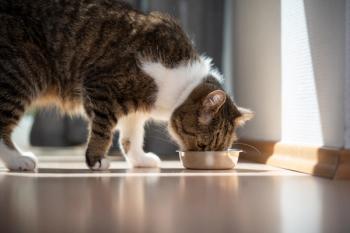
Why does PU/PD improve in cats on SGLT2 inhibitors?
A small animal internist answers the question in an interview with dvm360.
Polyuria and polydipsia (PU/PD)—excessive urination and thirst/drinking—are common concerns in cats with diabetes. Approximately 80% to 90% of cats on sodium-glucose cotransporter 2 (SGLT2) inhibitors will show an improvement in PU/PD symptoms. In this video, Ellen Behrend, VMD, PhD, MS, DACVIM (SAIM), consultant at Veterinary Information Network and Joezy Griffin Endowed professor and alumni professor Emeritus at Auburn University College of Veterinary Medicine, explains how SGLT2 inhibitors impact PU/PD in feline patients with diabetes and why many of these patients experience a significant improvement in this condition.
Listen to Behrend answer these other SGLT2 inhibitor-related questions in the following short clips:
Can cats on an SGLT2 inhibitor go into remission? Should cats on an SGLT2 inhibitor go on a special diet?
Below is the interview transcript, which has been lightly edited for improved clarity:
Ellen Behrend, VMD, PhD, MS, DACVIM (SAIM): A really common question is, why does the PU/PD get better? You would think with all that glucose in the urine it would not get better, but it does in about 80% to 90% of cats.
I'm not sure that it completely resolves but it's hugely better and the owners are happy. We're not exactly sure why that is. Remember, though, that the SGLT2 inhibitors are sodium glucose cotransporter inhibitors, so you're messing around with the reabsorption of sodium, and that is also going to affect PU/PD, get the renin angiotensin aldosterone system involved.
The more likely explanation is that we're controlling the blood sugar so well, that there's a lot less glucose in the urine than when [the patients are] first diagnosed. They come in, their blood glucose is 400, 500 [mg/dL], they have huge amounts of glucose in their urine. We bring that down with an SGLT2 inhibitor. There's less glucose in the urine and then the PU/PD gets much better.
Newsletter
From exam room tips to practice management insights, get trusted veterinary news delivered straight to your inbox—subscribe to dvm360.






